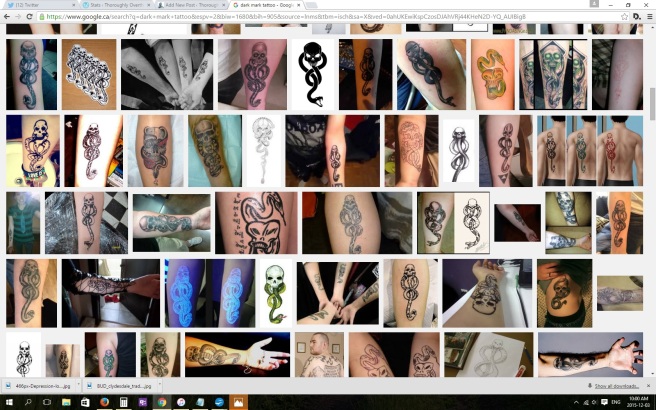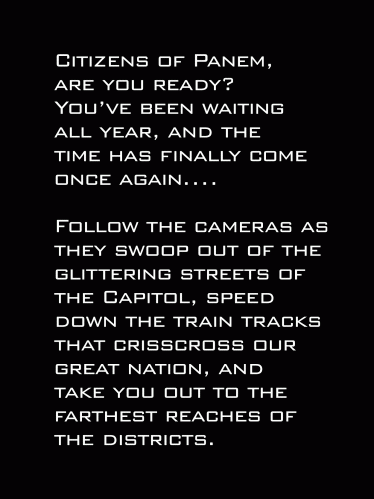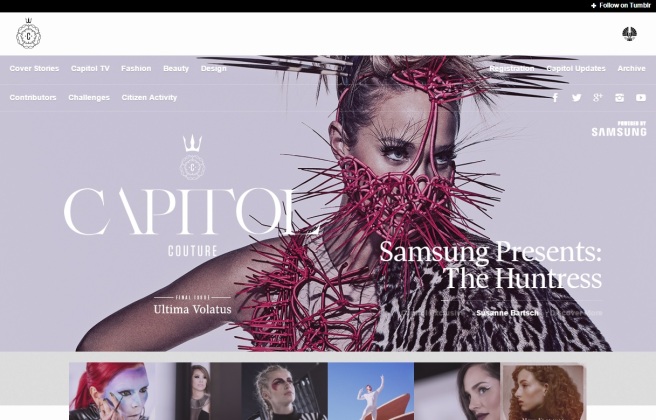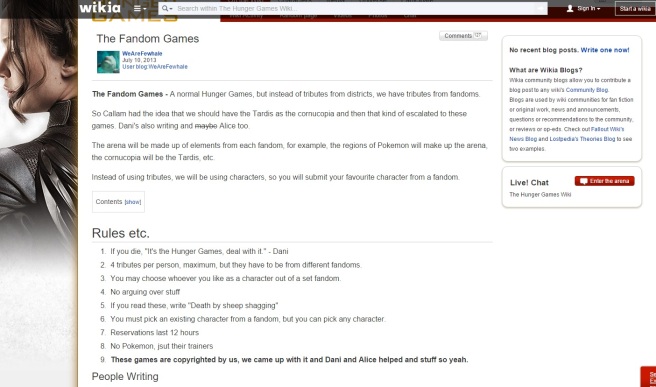Have you ever been baffled by how many fans within fandoms seem to miss the point?
Let’s start with Harry Potter, since I was just speaking about it recently. The story of Harry Potter promotes good actions over bad, chides against judging people are purely good or purely evil, and warns against the mistreatment of persecution of others regardless of race, wealth, personal ability etc.
The “bad guys” in the story are those who mistreat sentient magical races such as elves and centaurs, consider themselves superior to non-magical people (muggles), and are openly classist and racist (although instead of being racist against people with different skin tones, they are instead racist towards, say, half-giants and the like).
These bad guys have a symbol – one that they brand on their own skin to mark themselves as followers of Voldemort. It is called the Dark Mark.
…and a lot of fans have branded themselves with the same mark.
Now, I’m not saying this is WRONG.
Sure, it’s the Harry Potter sign of hatred, persecution, and murder, similar to the swastika in real life, but unlike a swastika, no real people have ever suffered or died in the name of this symbol.
So it isn’t hateful or hurtful or insensitive or anything like that. It’s PRETEND.
But it’s also BEMUSING.
Surely, if you want to brand yourself with the dark mark, you identify in some way with the “bad guys” in this series. You love the books AND the symbol so much that you are willing to put it on your own flesh in imitation of these imaginary characters.
And that baffles me. I mean, if you love a series that promotes a message of acceptance and love, then why would you also identify with the symbol WITHIN the series of rejection and hatred?
To me, it’s like reading/watching Schindler’s List and thinking, “Nazis. Those guys seem cool. What a great story!”
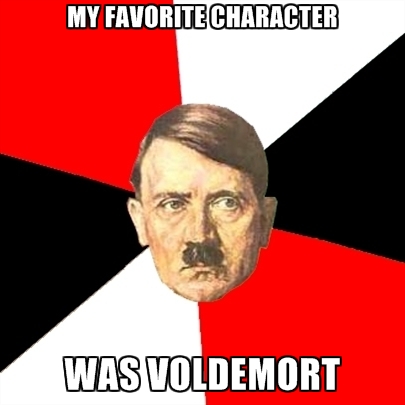
There’s more, too.
In the Harry Potter fandom lexicon, the word “muggle” is used to refer to people who don’t like Harry Potter, haven’t read Harry Potter, or even just anyone who is unpleasant.
In other words, it is used as a mild insult.
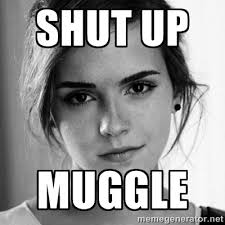
The above meme exemplifies the sort of disconnect I see – Hermione, champion of all disadvantaged folk,would never use “Muggle” as an insult.
People love the Harry Potter world, and they place themselves within it in the place where they feel that they fit most. If that means that they place themselves amongst the “bad guys”, then so be it. They will proudly brand themselves with a Dark Mark, use the word “muggle” as a put-down and won’t seem to suffer any cognitive dissonance from the actual message of the books.
This is not a problem with the Harry Potter fandom.
This is just people being people.
Look at The Hunger Games.
My husband and I have been struck again and again by the fact that the marketing for the Hunger Games films have been addressing the public as if we are living in The Capitol. Before the first film, there were “tribute guide” books published, addressing readers as citizens of the capital.
They even have a website and makeup line dedicated to the Capitol “look”.
Why do they do it?
Because of COURSE people identify with the Capitol. We live in a wealthy, first world society that loves to watch the suffering of others in reality shows. We don’t identify with the starving, trodden-on, marginalized people of the Districts.
Even among the actual fandom, not just the marketing machine, people unconsciously identify with the Captiol. You see people pitting their favourite characters from other fandoms in a Hunger Games sort of idea. You know, as if they are the Capitol and want to pit characters against each other in fights to the death.
Tired of book/movie fandoms? Let’s talk about Stephen Universe.
Stephen Universe is a cartoon show that adults have embraced for is feminist-friendly, queer-friendly, body positive themes. They are delighted by this inclusive show that promotes love and acceptance in all of its forms, and that represents super heros as overweight, or ethnic in appearance.
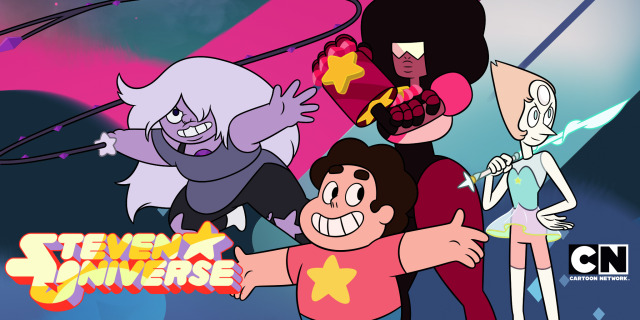
So when some fans redraw those characters to look thinner or whiter, the other fans get understandably upset. Not only is it racist/fat shaming and so on to suggest that the characters would look better if they were less diverse, but by redrawing characters to look more mainstream, surely they are missing the point of the show.
…Except here’s the thing – some of those angry fans become frighteningly hateful over this missed point, until it begins to appear that they themselves have also missed the point, even driving one ignorant young teen to suicide over their hate of her whitewashed fan art in a drama which perfectly exemplifies the sort of argument where absolutely everyone is in the wrong.
The fact is that people love to love things, but they don’t really like to change who they are based on that love.
No matter what a bigot loves, they will use that love to glorify their bigotedness. Some will use the Bible, some will use the Quran. Some will use a book series, or tv show. The message of these books or shows seems to matter less to the overall populace than the actual world within it.
If someone is looking for a God on their side, they may latch on to the Bible and find a reason to justify any kind of action in God’s name, no matter how vengeful. If someone loves magic, they may latch onto Harry Potter. A vampire fan may love Twilight or Anne Rice (but probably not both). Then they will use the inspiration that they draw from these sources to make a world of their own liking which is independent to the message intended by the original creator.
Of course, there are other kinds of people in the world, too. They will use their love of The Hunger Games to fund raise a food drive, or their love of the Bible to collect warm blankets for the homeless. 
But within every fan group or religion (and really, are the two so different?), you will have the people who seem to have missed the message. Which, I have to say, is a bit of a bummer from an author’s point of view.
An author who creates a story that preaches acceptance needs to also accept that some of her fans will use her story to justify ostracism. There will be people out there who love the characters she dislikes most, and hate her favourites.
In other words, the fans will take a certain amount of ownership and their interpretation of the world and characters will be as diverse as they are.
JK Rowling has accepted this with grace, often just saying that she is amused by some of her fans’ interpretations of her text, and the exclusionary behaviour of some of the fans.
“I discovered MuggleNet that first-ever afternoon and I went in the chatroom, and it was so funny. I was treated with outright contempt. [Laughter.] It was funny, I can’t tell you.[…]”Yeah, yeah, shut up, you’re not a regular, you don’t know a thing.” You can imagine!” – JK Rowling, 2005
I wonder if they called her a muggle?
She takes the right attitude. Some might be tempted to get upset – “Hey, I wrote a book about not judging people based on first impressions and here you are doing just that.” But I think that she knows that people will always be people. That’s how she came to write such complex and believable characters to begin with.
Although she is a little concerned by how many people love Draco Malfoy, because he’s a mean little jerk.
” People have been waxing lyrical [in letters] about Draco Malfoy, and I think that’s the only time when it stopped amusing me and started almost worrying me….it is uncomfortable and unhealthy and it actually worried me a little bit, to see young girls swearing undying devotion to this really imperfect character, because there must be an element in there, that “I’d be the one who [changes him].” I mean, I understand the psychology of it, but it is pretty unhealthy. So, a couple of times I have written back, possibly quite sharply, saying [Laughter], “You want to rethink your priorities here.” –JK Rowling, 2005
…But then, that’s a whole other post.

